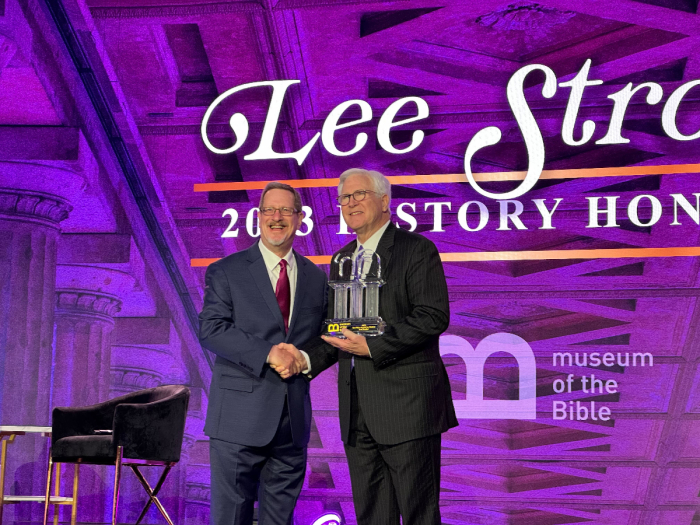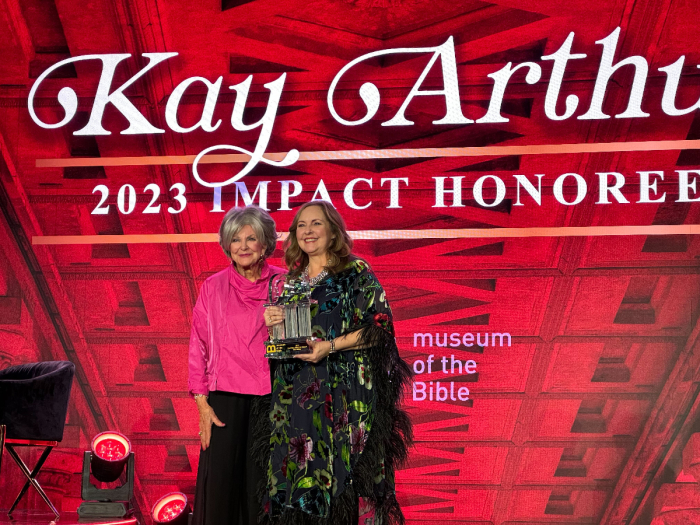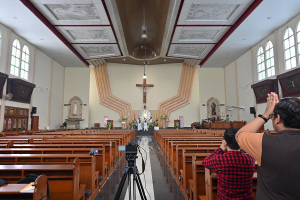Lee Strobel, Greg Laurie and Kay Arthur honored with Museum of the Bible's 2023 Pillar Awards

WASHINGTON — Three influential Christians have been honored for exposing the Bible, “the greatest story of all time” to “millions of people.”
The second annual Pillar Awards was held at the Museum of the Bible on Saturday, where three Christian leaders were recognized for “reaching the world through the Bible’s message.” The Pillar Awards were part of the museum’s 2023 Gala & Experience, titled “The Story.” In a video message shared at the ceremony, Christian songwriter Matthew West alluded to the significance behind the event's title, referring to the Bible as “the greatest story of all time.”
Dave Stotts, who has traveled the world to show people the actual locations recorded in the Gospels in a series of educational videos called “Drive Through History,” hosted the ceremony. As Stotts explained, the Pillar Awards refer to the pillars that underpin the Museum of the Bible: history, narrative and impact.
“Those same pillars are the foundation for the creation of the Pillar Awards,” he said. “We launched it last year to honor individuals and groups who are leveraging those pillars to engage people with the transformative power of the Bible through their talents, ideas and platforms.” He praised this year’s Pillar Award recipients as “three individuals who have literally impacted the Christian faith stories of millions of people.”
Abby Robertson of The Christian Broadcasting Network presented the awards to the recipients, whom she described as “three of the most influential Christian leaders in the country,” and interviewed them on stage. In addition to the video message from West and the interviews with awardees, the ceremony featured a performance by Christian musician CeCe Wynans.
Lee Strobel, former journalist and the author of The Case for Christ, received the Pillar Award for history. Stotts outlined how this honor is reserved by those “who reinforce the Bible’s history by discovering, preserving and communicating the authenticity of God’s Word to the world.” The publication of The Case for Christ followed Strobel’s effort to disprove the existence of Jesus Christ, with his discoveries resulting in him embracing and converting to Christianity.
Strobel reflected on his experience as he accepted the award on stage: “I was an atheist for much of my life, and I lived a very immoral and drunken and narcissistic and profane life. And I never could have anticipated first of all coming to faith. I thought religion was a crutch that it was based on make-believe.”
“I thought faith was believing something even though you knew in your heart it couldn’t be true,” he added. He attributed his initial quest to refute the existence of Jesus Christ to his wife’s conversion to Christianity after meeting their new neighbor, who invited her to church.
Strobel said: “I thought maybe I could rescue her from this cult that she’s gotten involved in if I could just disprove the resurrection of Jesus. And so, I took my journalism training and legal training and spent two years trying to do that and coming to conclude that based on the avalanche of evidence that points so powerfully toward the truth of Christianity, it would take more faith to maintain my atheism than to become a Christian.”
“God changed my values, my character, my morality, my worldview, my philosophy, my attitudes, my marriage, my parenting, my relationships,” he recalled. “I never could have anticipated what God would do, and so I give Him all the glory.”
Following his conversion, Strobel gave up his journalism career to focus on advancing the Christian faith. He worked as a teaching pastor at three American Christian churches and hosted the television program “Faith Under Fire.” Strobel has written several books since The Case for Christ, including The Case for Heaven.

Pastor Greg Laurie received the Pillar Award for narrative. As Stotts noted, the honor is reserved for “those who have brought the stories of the Bible to life through cultural mediums.” Laurie leads Harvest Christian Fellowship, a multi-site congregation of 15,000 in California and Hawaii, with a weekly virtual service that attracts over 100,000 viewers. His story of conversion became the subject of the film “Jesus Revolution,” released earlier this year.
Laurie converted to Christianity as part of the “Jesus Movement” that spread throughout southern California half a century ago. He told Robertson, “I didn’t realize I’d walked smack dab into the middle of a spiritual awakening,” which he referred to as “the Fourth Great Awakening in American History.”
Laurie’s efforts to convert people to Christianity continue to this day, and he sees “Jesus Revolution” as a powerful instrument for evangelization: “We want to reach unexpected people in unexpected places with an unexpected message. So when you have a film on Netflix, you’re playing on Delta Airlines as ‘Jesus Revolution’ has been playing or on other platforms like Apple and Amazon, you reach people that would not necessarily go to church.”
“Jesus did not say the whole world should go to church, but He did say the church should go to the whole world, so we’re always looking for creative ways to get to people,” he added. “A lot of times as Christians, we want to isolate from culture, but in reality, we need to permeate and infiltrate culture with the message of the Gospel.”

Kay Arthur received the Pillar Award for impact. Stotts identified the purpose of this award as to recognize “individuals who have made a significant kingdom impact on many lives through their lifetime of dedication to sharing the Bible’s message.” Arthur, a Bible teacher, has authored over 100 books and Bible studies.
Arthur has been inducted into the National Religious Broadcasters’ Hall of Fame. The awards ceremony took place on her 90th birthday. At the dinner preceding the awards ceremony, attendees sang “Happy Birthday” to her.
“I cannot believe that this is happening on my birthday,” she said. “I feel totally inadequate, but I will tell you one thing. I was raised with a religion without a relationship.”
While Arthur was “baptized” and “confirmed,” she told the audience that she had become “immoral and had sunk into a pit that I dug with my own hands.” She pointed to the day that her first husband died by suicide as the “day when God brought me face to face with all of this.”
“There’s one thing that’s my life, and that’s the Word of God,” she proclaimed. She detailed how, after her conversion, she “wanted everybody to know and to understand God’s Word.” Her organization, Precept Ministries, has shared the Word of God with 190 of the world’s 206 countries.
Ryan Foley is a reporter for The Christian Post. He can be reached at: ryan.foley@christianpost.com




























